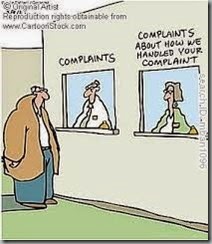The most difficult thing

I saw a challenge recently to “go for a day without complaining.” I looked at it and thought “Hah! That’s not a challenge! Who complains that much that a day seems like a challenge?” Then I started making notes of complaints. Well, howdy – there’s a whole litany of complaints throughout the day! It’s actually, and sadly, easier to go a day without saying “Thanks” than it is to not complain! We start the day with a grumble about the weather… “Oh, it’s too cold.” (which I will admit has been going on here for the past 7 months.) “Oh, it’s raining.” “It’s so hot!” Then there’s the “I don’t know what to wear” group… “Will you hurry up? We’re going to be late!” “All the lights are red! And this traffic!” “Who was supposed to do this?” “What is taking so long?” “Why can’t they get my order right?” “Oh that line is so slow!” “This day is dragging!” (or “I haven’t had time to even go to the washroom, I’m so busy!”) “I’m doing the job of 4 people!” “What is that idiot




